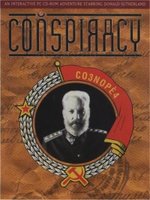KGB (computer game)
|
|
| KGB / Conspiracy | |
| Developer: | Cryo Interactive |
| Publisher: | Virgin Entertainment |
| Release date: | 1992 |
| Genre: | Adventure |
| Game modes: | Single player |
| ELSPA rating: | +15 |
| Platform: | DOS, Commodore Amiga |
| Media: | Floppy disc/CD |
| System requirements: | 386 20 mhz CPU, 4MB RAM, 256 colour VGA graphics |
| Input: | mouse |
Missing image KGB_cryo_screenshot.png PC screenshot | |
KGB is a computer game released for the Commodore Amiga and IBM PC Compatible computers in 1992. Set in the decadent final days of the Soviet Union, KGB is one of the best adventure games released for both systems and it's considered to be quite difficult, even for experienced gamers, since it relies on a real time clock and correct/wrong answers which can end the game immediately or after an event needed to be triggered. Sometimes, players might only notice an error committed hours after. The game engine has plenty of similarities with Cryo's Dune, and was also released in CD, which included clips of Rukov's father played by Donald Sutherland giving advice. It was released soon after the floppy version, it's called Conspiracy.
You play Captain Maksim Mikahilovic Rukov, recently transferred to the Department P from the GRU after three years' duty to investigate possible corruption inside the KGB (after a former agent turned private eye was found murdered). However, as the plot progresses, Rukov finds himself investigating a party hardliner anti-Perestroika plot that threatens the life of General Secretary Mikhail Gorbachev.
Rukov was born on 12 January 1966 in Sverdlovsk. His parents, Mikhail Stepanovich Rukov and Svetlava Shailova, were killed on 23 May 1983 during an Afghan terrorist attack in Dushambe Tadzhik where his father was on active duty. Maks' uncle Vanya was also injured in the attack and confined to a wheelchair, but still able to take care of his nephew. Rukov learned english, arabic and spanish and joined the Spetsnaz as a Paratrooper in 1988. Although considered an excellent official, his tendency for individualism made him not recommendable for high ranks in the chain of command.

